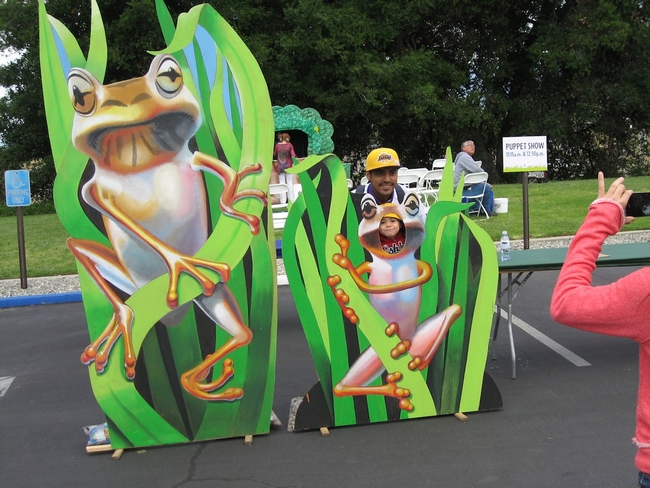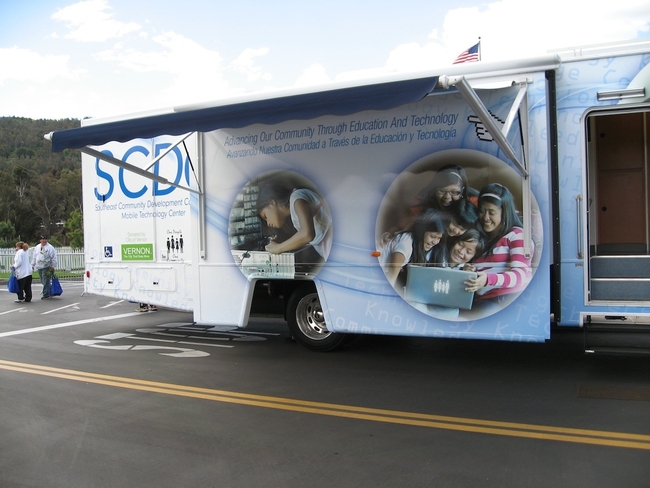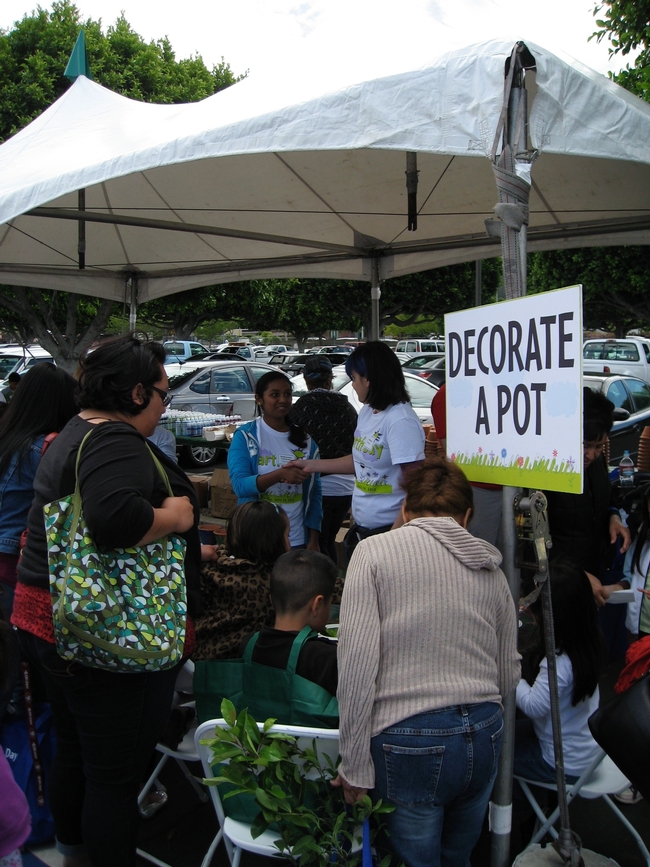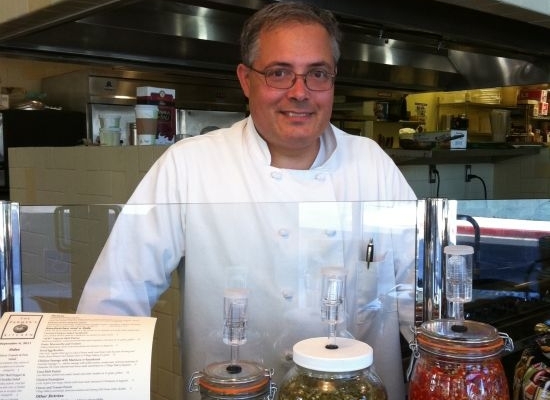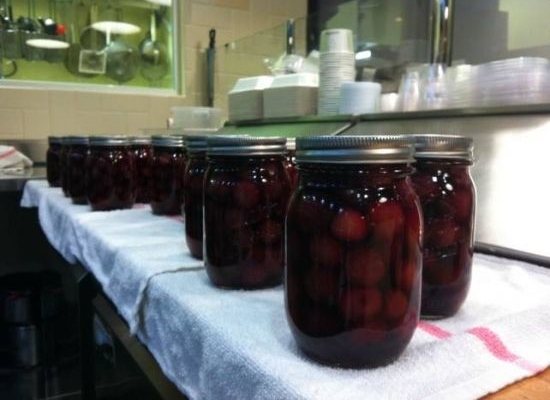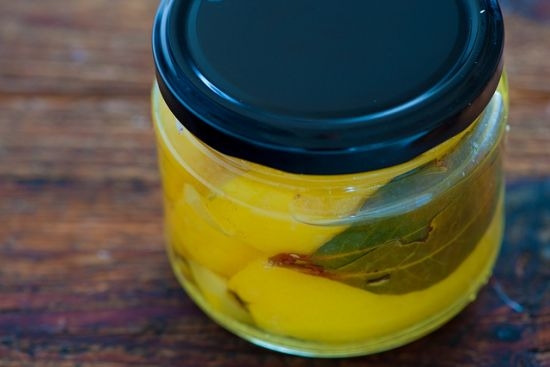Posts Tagged: Earth Day
A Touch of Red on Earth Day
It's Earth Day, an event we celebrate every April 22 to demonstrate support for environmental...

A honey bee touches down on a rock purslane, Calandrinia grandiflora. This plant yield red pollen. (Photo by Kathy Keatley Garvey)

A honey bee rolling around in rock purslane on Earth Day. (Photo by Kathy Keatley)

A honey bee packing red pollen from the rock purslane. (Photo by Kathy Keatley Garvey)

A honey bee leaving a rock purslane and heading off to another one. (Photo by Kathy Keatley Garvey)
Celebrating the Honey Bees and Earth Day
Doom or gloom? Boom or bloom? Today is Earth Day, and millions of folks around the world...

Two honey bees forage in the tower of jewels, Echium wildpretii. (Photo by Kathy Keatley Garvey)

A cordovan honey bee dives head first in a tower of jewels blossom. (Photo by Kathy Keatley Garvey)

A honey bee, its tongue or proboscis extended, heads for a nectar treat. (Photo by Kathy Keatley Garvey)
OrganicAuthority.com Interview with MFPLA Lead Instructor Ernest Miller
REPRINTED WITH PERMISSION OF ORGANIC AUTHORITY (www.organicauthority.com)
Earth Day Profile: Chef Ernest Miller on a Different Kind of Soul Food
Written by Lacy Boggs Renner
(image: The Farmer's Kitchen)
In the heart of the bustling Hollywood Farmers Market sits The Farmer's Kitchen: a farm-to-table cafe as well as a commercial teaching, processing and retail kitchen offering affordable, healthy foods for patrons at all income levels. We chatted with chef Ernest Miller about the concept of The Farmer's Kitchen, the importance of eating "food in context" and the selfish reasons why Americans should be getting to know their farmers.
Organic Authority: What is the mission of the Farmer's Kitchen?
Ernest Miller: The Farmer's Kitchen is a non-profit community-oriented kitchen. We are a project of Sustainable Economic Enterprises of Los Angeles (SEE-LA), the non-profit that runs eight farmers markets in the Los Angeles area, including the largest, the Sunday Hollywood Farmers Market, which celebrates its 21st anniversary this year.
The Farmer's Kitchen supports the mission of SEE-LA in many ways: we serve a farm fresh, from scratch lunch to 280 elementary students at a local charter school (Larchmont Charter School West Hollywood) that is part of Alice Waters' Edible Schoolyard Project; we operate as a farm-to-table cafe, serving breakfast and lunch; we provide job and career training to culinary students, high school students and members of the general public who want to learn what it is like to work in a professional restaurant; we provide classes to low resource families (diet, nutrition, cooking, exercise) and classes for the general public; we also make many preserved foods and value-added products with farmers market produce.
(image: The Farmer's Kitchen)
OA: How are you actively involved in the local community?
EM: We are major supporters of the Master Food Preservers of the University of California Cooperative Extension, Los Angeles County, hosting some of their classes in the kitchen. We've also supported the Orange County Master Food Preserver program. We provide technical assistance to the Hollywood Orchard Project, helping them preserve the fruit from their neighborhood.
OA: What drives your menu creation?
EM: The fresh, seasonal produce of the Hollywood Farmers Market, as well as the many different preserved foods we also create.
OA: How do you work with local farmers?
EM: We work very closely with our local farmers, speaking to them on a weekly basis to learn what will be coming in soon, or leaving soon. We make suggestions on what they might want to grow and encourage and consult with them on making value-added products.
OA: Why is it important to you to support local sustainable farmers?
EM: If it isn't sustainable then, by definition, it cannot continue indefinitely. Our industrialized food system has been a boon in many ways, but is not ultimately sustainable. We believe that sustainability is going to have to start with local farmers and teaching people how to eat with the seasons. Local food also tastes better, when it is grown and harvested for flavor, not for shipping well. We believe in "food in context" — that when food is seasonal and expresses the history and culture of a place, it tastes best.
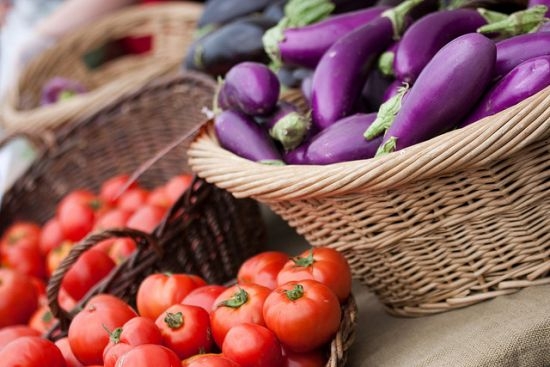
OA: What does sustainability mean to you?
EM: Sustainability means a practice of agriculture, cooking and eating that can go on indefinitely without destroying the health of our environment or ourselves. It is not just the farmers that need to be sustainable, but those who cook and eat the food as well.
OA: Why is it important for Americans to get to know where their food comes from, how it was raised and their farmers?
EM: Self-interest. Food tastes better when it is harvested locally and in season. It is generally less expensive, and is certainly less expensive when you take into account fair labor practices, environmental harms and all the other hidden costs of our industrialized food system.
Ultimately, we need to pay more attention to how and what we eat. We need to eat in context, knowing the place, history and culture of what we eat. When we eat, we feed not only our body, but mind and soul as well. If you don't know where your food comes from, how it was raised and who raised it, you may be feeding your body, but you are starving your mind and soul.
OA: How can America help revive the regional local farmer infrastructure that disappeared over 50 years ago?
EM: Support your local farmers, visit their farms, encourage and support programs that introduce children to what farming is all about (farm-to-school, 4-H).
OA: What cooking tips do you have to inspire home chef to cook more seasonally?
EM: Don't use recipes. Learn techniques, shop the farmers markets for fresh, delicious produce, and cook it simply.
OA: What is your must have, go-to home cooking tool?
EM: A 10-inch Chef's knife.
OA: What are your favorite must-have home pantry staples?
EM: A good extra virgin olive oil, a good pomace olive oil, home pressure-canned beans, brown rice and just to give a special, unique twist to all sorts of dishes, preserved lemons.
(image: jules:stonesoup)
OA: What shopping tips do you have for the home chef?
EM: Shop at a farmers market and see, feel, smell and taste the produce. Talk to the farmers, and don't be afraid to try something you've never had before.
Organic Authority would like to thank Ernest Miller and all of the sustainable, organic farmers and chefs whose work is providing healthy food for us all to eat. We honor you as being conscious stewards of our planet. And, we are thrilled to have you participating in our Earth Day event!
Earth Day Festival April 14, 2012
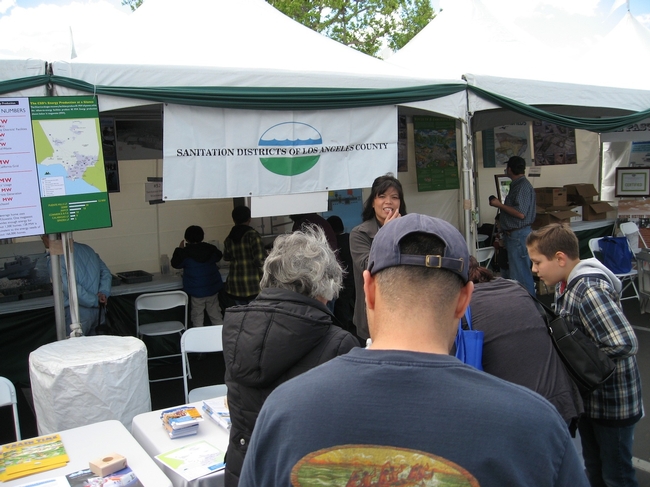
Crowds of people, young and old, were waiting eagerly at the entry gate well before the start time of 10 a.m. Teamed with our fellow UCCE/Los Angeles County Master Gardeners—and located between the booths of Engineers Without Borders, OrangUtan Republik Foundation, and across from Friends of the Los Angeles River, we shared a table and white canopied booth and stayed busy, non-stop till 2pm, talking to people about their gardens and the art of food preservation. In all nearly 2200 people came through the Earth Day Festival and at least 500 of them stopped at our booth.
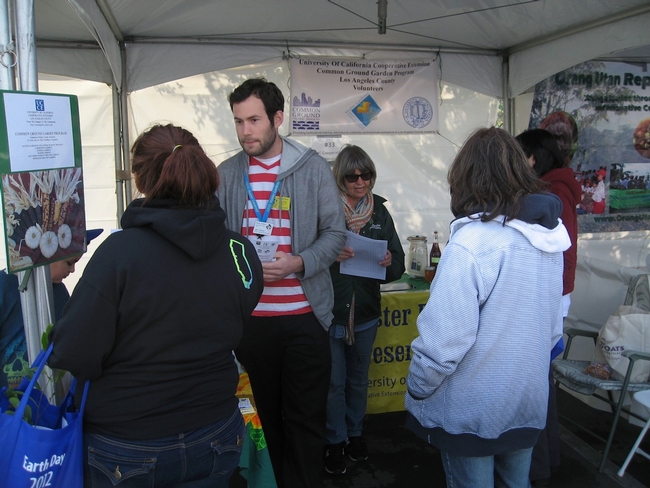
We also showed off jars of waterbath processed jams and marmalades, and pressure canned chicken and squash, which gave us a chance to explain how many methods of food preservation are available to the home preserver, along with tips for food safety practices.
More than one person said "My mom or my grandma used to can everything but I never learned how to do it." We explained that our role as MFPs was to offer our services as volunteer instructors to teach them how to do it themselves. We asked them to bring word back to their organizations and let them know to call us if they wanted free lessons.
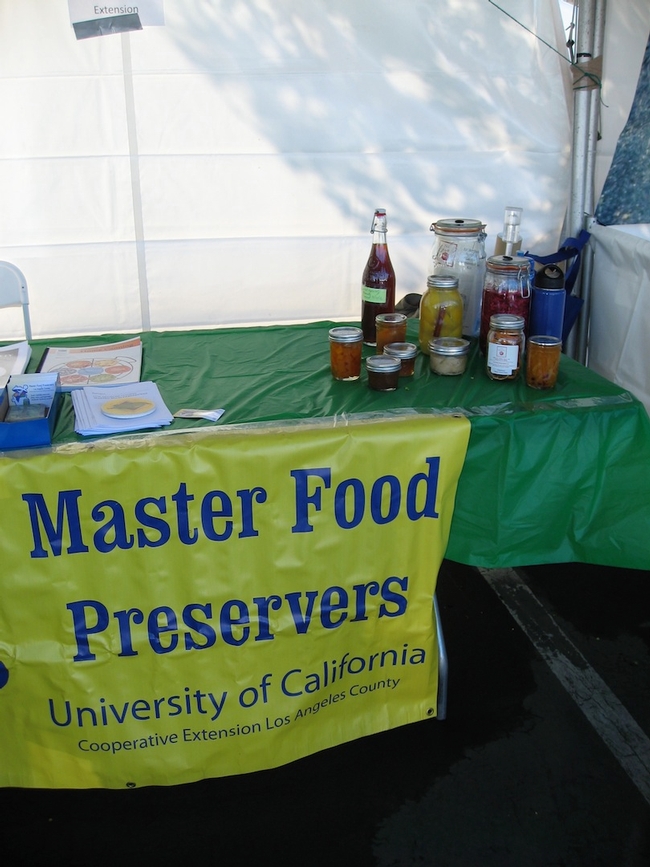
Attached to the veggie packets we stapled MFP cards so that people would connect the idea of growing, harvesting then preserving their veggies and herbs knowing they could contact us for the know-how.
Families were out in force and many of the little ones were carrying around small plant pots that they had decorated at a special booth. Each pot contained a seed...some were given watermelon seeds, some had sunflowers, and of course we reminded them that these plants would need a lot more room than the cute pots they carried and should be transplanted as soon as they’re big enough.
Different kinds of saplings were distributed by various agencies, and people were carrying them around the festival grounds, looking just a little bit like Johnny Appleseed carting his apple trees across the country.
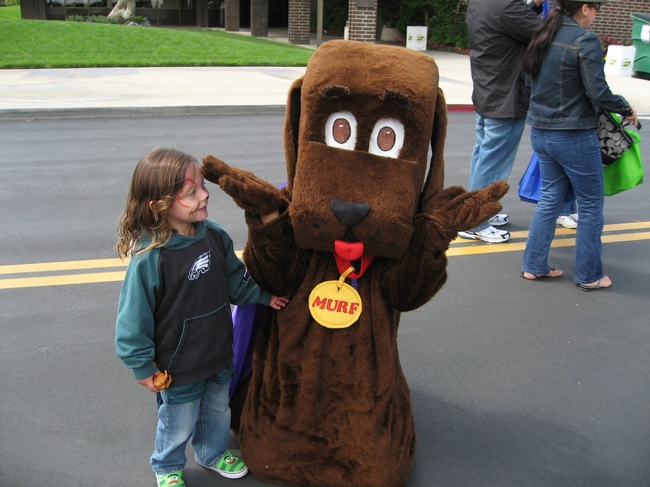
By the time the day ended, our seed supply had nearly been cleaned out, we'd talked to many hundreds of people about food preservation, and we felt we’d had a very successful day.
